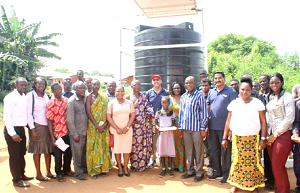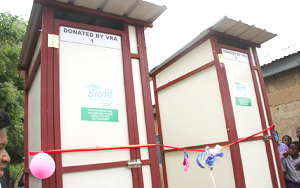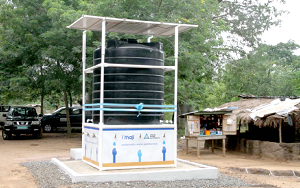
Using CSR to promote healthy, productive communities
The VRA believes in the saying that, a sound mind is found in a healthy body. The Authority, therefore, sets out to use its CSR agenda to encourage and ensure improvement in the health of the people within its impacted communities.
Advertisement
The VRA thus invests heavily in the provision of health facilities, health education, water and sanitation amenities for the communities. The Authority caters for the health needs of communities under three major areas: Disease Eradication, Public Health and Sanitation.
Disease Eradication
The VRA maintains collaborative efforts with the Asuogyaman District Health Management Team in the eradication of malaria, bilharzia, and other water-borne diseases. These activities are guided by Memorandum of Understanding (MoU) that details out plans for the eradication of malaria with support from the John Hopkins University Centre for Communication.
The VRA also provided periodic fumigation and disinfection services for five communities and all work locations as part of efforts to prevent the spread of the COVID-19 virus.
Public Health
The VRA, through its Schistosomiasis Control Programme, frequently undertakes Mass Drug Administration Programmes in communities along the Volta Basin. For the past six years, the VRA has partnered the Ghana Health Service (GHS) in the Schistosomiasis Control Programme by allocating funds annually for the implementation of the intervention.
Studies by the GHS in 2018 revealed a reduction in the prevalence levels of urinary schistosomiasis over the previous year in 42 communities in six districts, namely South, North and Central Tongu, South Day, Ada East and Shai Osudoku districts.
In 2015, the VRA took a giant step to help find a lasting solution to the spread of schistosomiasis in impacted communities along the Volta River. This involved the provision of potable water and sanitation facilities as a more sustainable way of curbing the spread of bilharzia in over 300 riverine communities in 11 districts within the VRA’s operational areas. The first three communities that benefited from its water system are Korankyi and Sedorm in the Asuogyaman District and Amlalokope in the North Tongu District.
Sanitation

Donation of bio-digester lavatories at Kebenu in the Central Tongu District in the Volta Region
Safe drinking water and good sanitation promote healthy communities. Therefore, besides the provision of potable water source, the VRA provides toilet facilities to the impacted communities to ameliorate the harmful sanitation conditions of living.
In 2019, the VRA, in partnership with Project Maji Foundation, an NGO involved in the provision of potable rural water solutions, provided Teikpitikorpe, a bilharzia endemic community in the Ada East District, with a solar-powered mechanized borehole.
In 2020, the VRA converted two defunct boreholes into solar-powered mechanized water systems at Atrobinya in the Shai-Osudoku District and Volo in the North Tongu District.
Further collaboration between the VRA and Project Maji Foundation, saw the construction of a mechanised borehole for Kplordiwlor in the South Tongu District in 2020, the conversion of a borehole into a solar mechanised system for Battorkorpe in the Upper Manya District in 2021, a solar-powered mechanised system which uses the slow sand filtration method in Akplorti in the South Tongu District and a solar-powered mechanised water system at Asikuma-Dansokrom in the Asuogyaman District, also in 2021.
In June 2022, the VRA provided three solar-powered water projects to three communities: Battorkope in the Upper Manya Krobo District; Dansokrom, near Asikuma, in the Asuogyaman District; and Akplorti in the North Tongu District. The facilities were again constructed by Project Maji.

One of the solar-powered mechanised boreholes in one of VRA’s impacted communities
Eradicating Open Defecation
In February 2018, the VRA constructed a mechanised borehole for three North Tongu communities, namely Amlalokorpe, Klukorpe and Afagbakorpe. This facility was also constructed by Project Maji Foundation to provide reliable and sustainable water to the communities at minimal maintenance cost.
The VRA has provided over 90 biofil sanitation facilities in the Central Tongu, South Tongu, Shama and Manya Krobo districts. Construction of 40 biofil sanitation facilities for the Government Hospital in the Kade District, and for some communities within the Authority’s operational areas, is underway.
Besides these, the VRA has provided 30 biofil sanitation facilities each to Kebenu and Dzebetato communities in the Central and South Tongu districts. These lavatories are supplied to tackle the menace of open defecation and improve the sanitation situation in those communities.
The VRA presented a cheque for GH¢2 million to the National COVID-19 Trust Fund as its contribution to support the government's efforts to combat the spread of Covid-19. The Authority again supported its impacted communities and other institutions of national character with COVID-19 personal protective equipment such as nose masks, veronica buckets and hand sanitisers.



